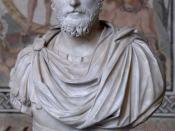"If," write Edward Gibbon," a man were called upon to fix the period in the history of the world when the condition of the human race were most happy and prosperous, he would, without hesitation, name that which elapsed from the death of Domitian to the accession of Commodus." Yet in the next century the Roman Empire collapsed into civil wars. When in 285 AD Diocletion pulled the empire together again, there was little left of the prosperity of Gibbon's period. Several factors can be attributed to the empire's decline. The fall of the Roman Empire weas the direct result of a crumbling economy and the rising apathy of its citizens.
It seems clear, then, that the causes of the collapse must, like hidden cancers, have been developing during Gibbon's period of happiness and prosperity. Some symptoms can be recognized. To take one example, in the first century of the empire, there had still been a vigorous literature (Rempel Online).
However, in the second century AD from Hadrian onward, with a few exceptions, Latin literature is overcome by a sort of indolent apathy.
The same apathy began to exhibit itself in municipal life. By the second century, financial burdens had been imposed on local magistrates and senators, and many cities had spent themselves into debt (Green 92). There was the cost of repairing and maintaining the temples, public baths, and the like. There were also heavy expenditures for civic sacrifices, religious processions, feasts, and the games necessary to amuse the proletariat. The wealthy citizens of the municipalities who were, in effect, the middle class, began to grow weary of the financial load. The constantly rising taxation rate was shearing them closer and closer to poverty. Furthermore, they were expected to help their communities out of debt by voluntary loans.
The extension of paternalism into daily life was accompanied by a tremendous increase in the personnel of the imperial civil service (Rempel Online). Each bureau expaned its field and bureaus were constantly being created. By the time of Antoninus Pius, who ruled from 138 to 161 AD, the Roman bureacracy was as all embracing as that of modern times. Naturally, too, as benevolent paternalism and bureaucracy took over, personal freedom tended to disappear (Rempel Online). To the cost of the bureaucracy was added the expense of the dole.
Originally, this was passed out once a month. By the time of Marcus Aurelias, there was a daily distribution of pork, oil, and bread to the proletariat. Meanwhile, the expenditures on the public spectacles kept mounting. A hundred million dollars a year is a moderate estimate of what was poured out on to the games (Rempel Online). There was likewise an attempt to combine subsidy to Italian farmers with charity to needy children, called the alimenta. Instituted by Nerva, who reigned from 96 to 98 AD, his system was to lend money at five percent instead of twelve percent to farmers with the proviso that the interest should be used to support the needy children (Green 75). There was also the army, it being essential to the security of the empore. The cost of it, though, more than doubled between 96 and 180 AD (Rempel Online).
Even with the decline of the Roman money, all thse expenditures had to be recovered from the taxpayer. Inflation seemed to have gathered momentum during the third century AD. The debasement of the denarius is particularly dramatic; whereas under Augustus, it was made of virtually pure silver, the gradual decline in purity and weight of the second century accelerated in the third, until it became little more than a bronze coin with a small percentage of silver (Green 61). To compound the difficulties there was an adverse balance of trade. Roman currency, for example, poured into India and the East to pay for luxuries. Even in the time of Nero, Senaca estimated that it cost Rome five million dollars a year to import its luxuries from the East (Rempel Online).
Though seemingly prosperous, in the second century AD the Roman Empire was overspending to such an extent that it was moving to an economic crisis.
There were cases, beginning with Hadrian, where, when municipalities got into financial difficulties, imperial curators were put in charge and the cities lost their independence (Rempel Online). The people didn't seem to mind. As often happens today, they were quite willing to resign their control of affairs and to let the government take care of them. Government paternalism, bureaucracy, inflation, an ever-increasing taste for the brutal and brutalizing spectacles of the ampitheater and the Circus Maximus were symptoms of spiritual malaise which had begun when political freedom was tossed away in the interests of peace security and materialism.
The fights themselves were bloodthirsty affairs. The gladiators were armed with daggers, swords, forks, and nets. They fought with slaves and criminals who were often not armed, or armed only with a net. When a gladiator was killed, an official would come out and check the dead body to make sure he was dead. Then, while trumpets played, the body was dragged out of the arena (Mulvihill Online). This sort of Roman entertainment, however, did not appeal to everyone. Seneca is quoted as saying, "One day I went to the midday games, hoping to enjoy light entertainment, rather than bloodshed. It was the exact opposite, the other shows I had seen were a picnic in comparison. This was pure murder."
Furthering the problems, there was the cancer of slavery and the equally dangerous practice of keeping a segment of the population permanently on the dole. There was free labor subsisting on starvation wages because of the competition of slavery. At the other end of the scale lolled a group of multimillionaires for whom no luxury was too extravagant. Nor did anyone perceive that inflation and rising taxation must ultimately squeeze the middle class out of being.
Meanwhile, a tide of oriental religions tried to fill the spiritual vacuum. A sense of futility seemed to permeate society. There were many outstanding administrators and good governors but, on the whole, the Roman spirit which had conquered the world seemed to have dissolved into an indolence which preferred ease and comfort to facing up to the dangers which threatened civilization (Rempel Online).
In any case, few Romans or Italians now served in the legions. Beginning with Hadrian, the army was decentralized, immobilized, and, if one may invent a word, foreignized (Rempel Online). Originally, only landed Roman citizens were allowed to serve in the Roman army. By 20 BC, some 300,000 soldiers served in the army; this number changed little thereafter (Gruen 444). Moreover, Hadrian also began the policy of filling up the army with provencials from the area to be defended and of allowing the Germans to settle in the Danubian provinces, provided they served as auxiliary troops when called.
So, by the time of Marcus Aurelius, the army was composed either of ignorant countrymen from the most backward parts of the empire or of foreigners. In spirit and in culture they were peasant wolves with little, if any, respect for the fat sheep they were supposed to protect (Rempel Online). This divorce between barbarized army and civilized but soft civilians contributed greatly to the collapse of the Roman Empire. When in 191 AD Commodus, the brutal son of the stoic emperor Marcus Aurelius, was assassinated, a man named Pertinax put on the purple, dooming the Roman Empire to a future of military bureacracy and civil war (Rempel Online).
The fall of the Roman Empire was the direct result of a crumbling economy and rising apathy of its citizens. As it often happens today, the people were quite willing to resign their control of affairs and to let the government take care of them. The Roman money was devalued and her people desensitized to violence and politics while the army gradually took control of the empire. Though many events of the Roman Empire parallel those of modern times, steps can still be taken to prevent such a catastrophe from happening again.
Works Cited:
Gibbon, Edward. The Decline and Fall of the Roman Empire. 3 vols. New York: The Heritage Press, 1947.
Green, Kevin. The Archaeology of the Roman Economy. Los Angeles: University of California Press, 1986.
Gruen, Erich S. "Ancient Rome." World Book. 2001 ed.
Mulvihill, Chloe. "Roman Entertainment." Online. Internet. (insert date visited here). Available http://ireland.iol.ie/~coolmine/typ/romans/enter2.html
Rempel, Prof. Gerhard. "Why Rome Fell." Online. Western New England College. Internet. (insert date visited here). Available http://mars.acnet.wnec.edu/~grempel/courses/wc1/lectures/14romefell.html


